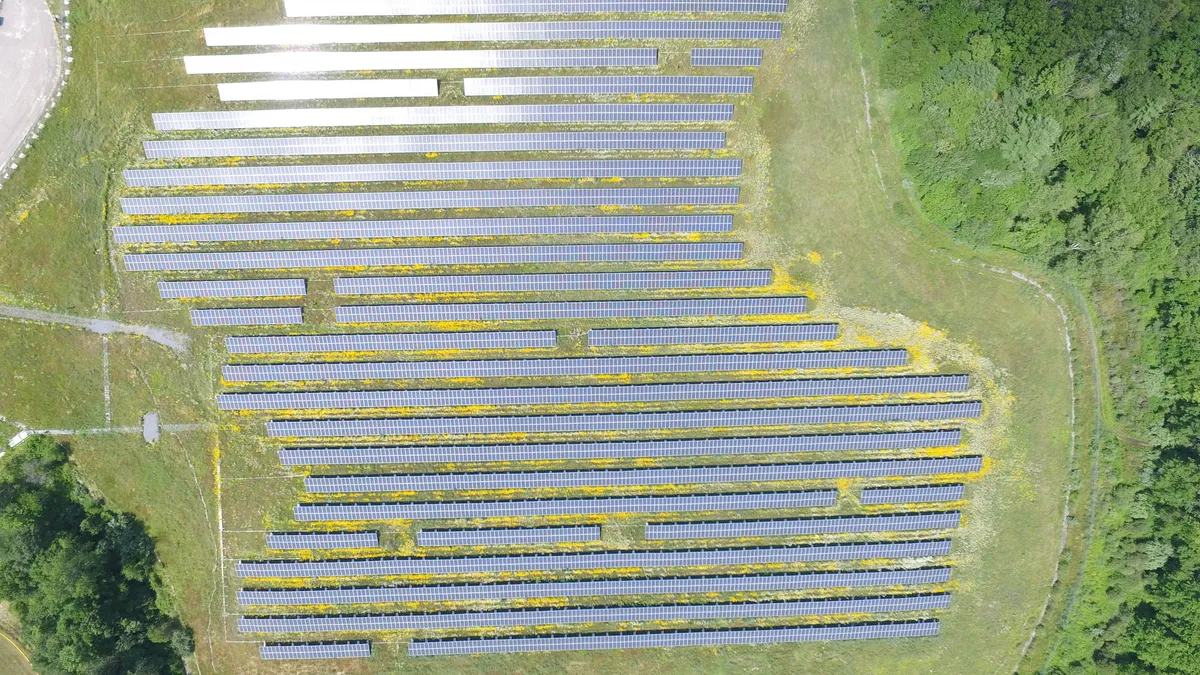Welcome to Scrap Collector, Waste Dive's Friday round-up of insights and stories you may have missed during the week.
PROPOSED VIRGINIA REFORMS OFFER A RAY OF HOPE FOR LANDFILL SOLAR
Landfilling has a bad rap among environmentalists — but thanks to ongoing legislative efforts, Virginia landfills may finally get their shot at redemption.
Last year's energy bill has the state gearing up for a solar surge — and, reports Energy News Network, Fairfax County wants landfills to play a part in that development. Specifically, county officials are pushing to build at least 5 MW of solar on a long-dormant landfill complex — a project many would consider eminently sensible: covering less desirable parcels of land (closed landfills, brownfields, former mine lands and other commercial sites) with solar farms is a far less environmentally impactful than using forests or farmlands. The practice, known as solar siting, is increasingly popularity in other states as a way to generate revenue from closed sites and expand renewable options.
The problem, however, is that Virginia currently limits solar arrays to serving only contiguous properties — meaning any power generated from landfills is inaccessible to anyone who isn't living right next to one. Other state mandates — including a cap on the size of arrays built under power purchase agreements and lack of virtual net metering — have also stymied progress.
However, solar siting may soon have its day in the sun: efforts to strike down legal barriers to landfill solar projects are gaining traction ahead of next month's legislative session. For James Patteson, director of Fairfax County’s Department of Public Works, the development can’t come soon enough — as he told Energy News Network, "Rooftop solar can only get us so far. We want to remove barriers so we can do the right thing with ground-mounted solar."
IN OTHER NEWS
Mystery garbage fire arsonist terrorizing downtown Orlando, Florida — Orlando Sentinel
After last week's story on California's recycling fraud bust, we thought we'd get a break from the crime beat — but not so fast! While most of us are happily ensconcing ourselves around crackling fireplaces (or resigning ourselves to sky-high heating bills) this winter, that's apparently not cutting it down in Florida. Instead, someone is going around Orlando setting garbage cans, recycling bins and dumpsters ablaze — as of last Friday, at least 11 fires have been reported in neighborhoods downtown.
Investigators still haven’t caught the perpetrator(s), and while the fires haven’t caused any major damage up to this point, residents' nerves are understandably frayed — as victim Christopher Ross told Orlando Sentinel, "Somebody came through and tried to hurt me and my family and they don’t even know us."
New study makes a game out of waste — UBC News
Never again dismiss games as a waste of time — or do, if you mean the "waste" part literally. A new online game created by University of British Columbia (UBC) researchers is teaching people how to more accurately sort their waste — and the results can be observed long after players hit the quit button.
Here's how it works: a waste item appears, and players sort it into one of four different categories — food scraps, recyclable containers, paper or garbage. So, okay, it's not the sexiest game ever invented — but according to the study, it's made a lasting impression on participants. After exposing students to the game, researchers proceeded to monitor the waste bins in their university residences — and observed both a slight drop in contamination rates and an increase in compost weight.
According to Jiaying Zhao, the paper's senior author, this uptick in recycling and composting accuracy proves that immediate feedback works — and transcends the computer screen. UBC, for one, is up for a round — a version of the game has already been adapted for the school's first-year orientation, complete with leaderboards and prizes.
Collins Aerospace developing an out-of-the-world trash compaction system — Press Release
Houston, start the countdown — it's about to be one small step for man, one giant leap for waste management. Collins Aerospace has proposed a streamlined compaction system that aims to decrease astronaut trash volume by 93% — "essentially reducing something roughly the size of a beer keg to a small pizza," to put it in frat boy terms. Collins will have 18 months to develop and test the design before NASA conducts a preliminary review — and while the system sounds pretty cool, Waste Dive (it needs to be said) will be more than a little disappointed if the final design doesn't end up looking anything like WALL-E.
Galveston, Texas restaurants have recycled 850 tons of oyster shells to restore reefs — KHOU 11
Oyster reefs are the most threatened marine habitat in the world: disease, pollution, overharvesting and climate change have plunged oyster populations to about 1% of their historical levels. It's the same story in Galveston Bay, Texas, where over half of oyster reefs are estimated to have been destroyed — primarily as a result of Hurricane Ike in 2008.
Area residents, however, are working with the Galveston Bay Foundation to take a stand against further depletion. The foundation's Oyster Shell Recycling Program collects shucked oyster shells from local restaurants (which crack open thousands of oysters per night), sun-bleaches the shells for a minimum of six months and then uses them to create new reefs in the bay — providing an ecosystem where oyster larvae can grow and, with all luck, thrive. To date, 850 tons of oyster shells have been recycled from Galveston Bay restaurants — a tiny but mighty example of community resourcefulness in the face of seemingly insurmountable odds.
AROUND THE WORLD
China's food waste dilemma gives rise to emerging cockroach industry — Reuters
Here's a story that puts the "best" into "pest." With expanding Chinese cities producing more food waste than can be landfilled — according to South China Morning Post, Beijing residents generated 9 million tons of scraps last year — iron-stomached entrepreneurs have turned to an unlikely solution: cockroaches. In Jinan, the capital of Shandong province, a facility run by Shandong Qiaobin Agricultural Technology Co is farming a billion cockroaches — and feeding them 50 tons of food waste per day. The company plans to establish three more cockroach corrals next year, with the eventual aim of processing a third of the food waste generated in Jinan — a city of approximately seven million people.
And the cockroaches pay it forward even after they die, providing a nutritious source of protein for pigs and other livestock. Similar cockroach plants have sprung up in other areas, proving once and for all that one man's trash really can be another man’s treasure — or a cockroach's delicious all-you-can-eat buffet feast.
SEEN & HEARD
The 2019 NYC Sanitation Calendar is now available! Join us at the NYC City Store (1 Centre St.) on Tues., Dec 11 at noon for a meet & greet and autographing opp with our calendar models! The calendar is available for purchase online: https://t.co/X655y8n4iF pic.twitter.com/O3AQad28YH
— NYC Sanitation (@NYCSanitation) December 8, 2018
best get this in while the coral be livin' https://t.co/9jd8Ggph9w
— Nidhi Subbaraman (@NidhiSubs) December 6, 2018























